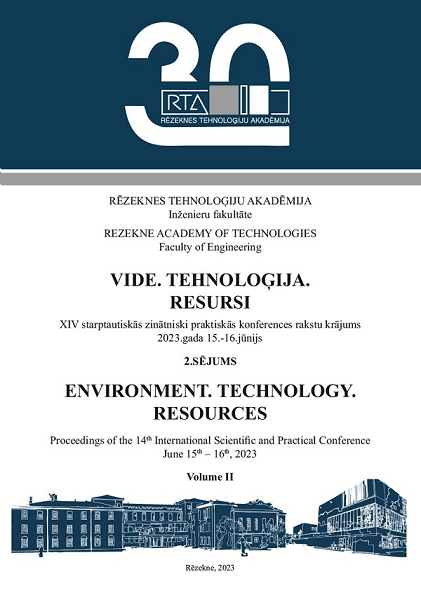TEACHING ENGLISH TO POSTGRADUATE STUDENTS IN A TECHNICAL UNIVERSITY DIGITAL ENVIRONMENT
DOI:
https://doi.org/10.17770/etr2023vol2.7292Keywords:
audiovisual translation, learning English, postgraduate students, technical universityAbstract
One of the main tasks of training postgraduate students in graduate school is to develop competences necessary to present and discuss the results of their research work in a foreign language in oral and written forms, as well as to fully understand foreign language scientific texts in their specialty.
In the last decades international scientific communication has shifted from a plural use of several languages to a clear dominance of English. The shift implies that an ever-increasing number of scientists whose mother tongue is not English have moved to English for publication and conference participation.
A literature analysis and own experience revealed such problems of postgraduate students’ training in foreign languages as heterogeneity of the contingent with an unequal and often low initial level of language proficiency, a limited number of hours allocated for practical classes in English; a low level of self-directedness in language learning, a lack of elementary knowledge of the scientific discourse.
In an attempt to solve these problems, the Department of Foreign Languages staff at Kharkiv National Automobile and Highway University have developed and implemented a training course for postgraduate students in two, traditional paper and online, versions, the latter designed with the use of such a modern approach in language didactics as audiovisual translation appropriate for self-learning and flipped classroom activities. The course comprised three modules: scientific reading, academic speaking and academic writing. Besides, postgraduates with the elementary level of English were offered a grammar course covering all the basic grammatical topics necessary to formulate correct written and oral utterances.
The effects of teaching English with the use of videos with recorded parallel bilingual vocabulary and texts placed on an online platform were compared to the results of the traditional teaching with the use of the paper copy.
The research was carried out in the 2021-2022 academic year and aimed, firstly, to compare language skills of two groups of learners: those who studied the course with the use of audiovisual technology (the experimental group) with those who studied in the traditional mode (the control group); and, secondly, to reveal how the level of self-directedness changed in the process of the course study in both groups. The study involved a mixed approach of quantitative and qualitative methods to diagnose the level of learners' language competence and self-directedness. Our results indicate that the use of audiovisual translation in teaching foreign languages improves students’ language skills and increases autonomy in studies.
It can be concluded that utilizing audiovisual translation due to auditory and visual support and opportunity for learners to study at their own pace has a significant impact on postgraduate students’ language proficiency though this approach requires further research and wider implementation.
Downloads
References
Resolution of the Cabinet of Ministers of Ukraine, No. 261, March 23, 2016 "On approval of the Procedure for PhD and DSc training in higher educational institutions (scientific institutions)" [Про затвердження Порядку підготовки здобувачів вищої освіти ступеня доктора філософії та доктора наук у вищих навчальних закладах (наукових установах)].
R. E. Hamel, The dominance of English in the international scientific periodical literature and the future of language use in science. Amsterdam: John Benjamins Publishing Company, 2007.
N. M. Dukhanina, “Features of PhD students training in foreign languages” [“Особливості навчання іноземних мов здобувачів вищої освіти ступеня доктора філософії (PhD)”]. Young Scientist, vol. 4 (56), pp. 489-492, Apr. 2018.
O. B. Petrova and N. O. Popova, The aspect of scientific training while learning a foreign language in a non-linguistic HEI [Аспект наукової підготовки при вивченні іноземної мови у немовному ВНЗ]: Problems and prospects of development of science at the beginning of the third millennium in the countries of Europe and Asia: proceedings of the 15th international scientific and practical internet-conference, June 30 – July, 2015, Pereyaslav-Khmelnitsky, 2015, pp. 205-207.
E. N. Yaroslavova and M. G. Fedotova, “Characteristics of teaching foreign languages to PhD students in a non-linguistic HEI [“Особенности организации обучения иностранному языку аспирантов неязыкового вуза”]: Science of SUSU: proceedings of the 67th scientific conference, April, 2015, pp. 1208-1214. Available: http://dspace.susu.ru/xmlui/ bitstream/handle/0001.74/5695/76.pdf?sequence=1&isAllowed=y
A. Tamzen, Cambridge English for Scientist. Cambridge: Cambridge University Press, 2011.
O. Bezzabotnova, S. Bogolepova, and V. Gorbachev, A communication skills course for tutors, lecturers and PhD students. Cambridge: Cambridge University Press, 2014.
N. V. Saienko, S. V. Ponikarovska, Ye. B. Novikova, and G. S. Sozykina, The manual in the English language for technical university postgraduate students [Посібник з англійської мови для аспірантів технічних закладів вищої освіти]. Kharkiv, KhNAHU, 2021.
The course in scientific reading, writing and speaking. KhNAHU, 2021 [Курс загальнонаукового читання, письма та говоріння]. Available: https://www.youtube.com/channel/UCF9gPDPSDh0djwmvv8ZyU6A/.
J. Lertola, “From translation to audiovisual translation in foreign language learning”. Trans. Revista de traductología, vol. 22, pp. 185-202, 2018.
J. Diaz-Cintas and S. Massidda, “Technological Advances in Audiovisual Translation”, in Minako O’Hagan (ed.) The Routledge Handbook of Translation and Technology. London: Routledge, 2019, pp. 255-270. DOI: https://doi.org/10.4324/9781315311258.
N. V. Saienko and G.S Sozykina, The use of a flipped classroom approach in teaching foreign languages to university students. Multidisciplinární mezinárodní vědecký magazín “Věda a perspektivy” je registrován v České republice. Státní registrační číslo u Ministerstva kultury ČR: E 24142. vol. 4 (4). Série “Pedagogika. str. 50-59, 2021. DOI: Série “Pedagogika” https://doi.org/10.52058/2695-1592-2021-4(4)-50-59.
H. Khiat, “Measuring Self-Directed Learning: A Diagnostic Tool for Adult Learners”, Journal of University Teaching & Learning Practice, vol. 12 (2), 2015. Available at: http://ro.uow.edu.au/jutlp/vol12/iss2/2
B. Williamson, “Development of a self-rating scale of self-directed learning”, Nurse Researcher, vol. 1 (2), pp. 66-83, 2007.


